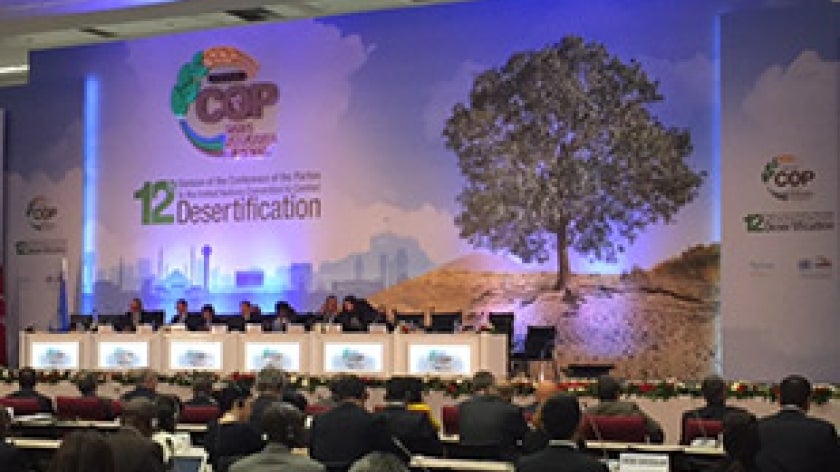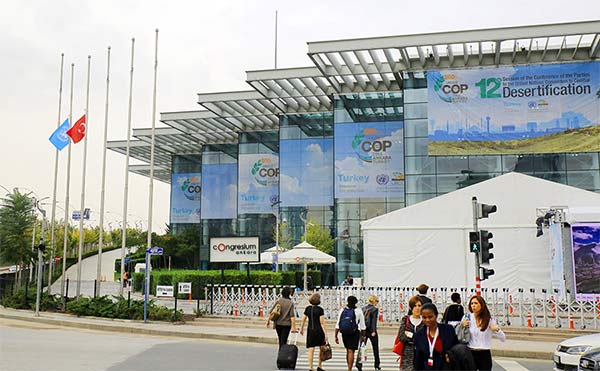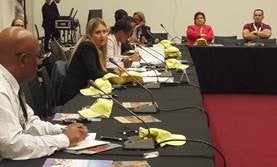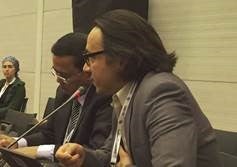

Every two years, parties to the UN Convention to Combat Desertification (UNCCD) gather to address the growing menace of land degradation.
The latest gathering, known as UNCCD COP 12 started on October 12 in Ankara after a moment of silence for the families and all those who lost their lives in the deadly bomb explosions that took place in the capital on Saturday.
Coming on the heels of the recently adopted Sustainable Development Goals (SDGs) and a little over a month before countries gather in Paris to agree a new climate agreement, this year’s conference came at a critical time for the global environment.
“How we protect and manage land resources sustainably and strive for land degradation neutrality, as embodied in SDG Target 15.3, will have impacts on multiple goals,” said Chizuru Aoki, heading the GEF delegation in Ankara. “The land agenda embodies the importance of tackling complex, interdependent issues in an integrated manner,” she said.
On October 20, the GEF CEO Naoko Ishii addressed the UNCD COP 12 in Ankara, Turkey via video message to announce a substantial contribution of USD 3 million for countries to support their target setting under the Land Degradation Neutrality (LDN) concept. Using set-aside resources of the 6th replenishment allocations for the Land Degradation Focal Area (LDFA), this enabling activity should enhance capacity of recipient countries to speed up target setting in line with the Sustainable Development Goals (SDGs).
Land Degradation Neutrality (LDN) is a clear and straightforward target that responds to the immediate challenge: How do we sustainably intensify the production of food, fuel and fiber to meet future demand without the further degradation of our finite land resource base?
A global commitment to LDN would explicitly recognize the unacceptable costs of inaction (i.e. continued land degradation as a result of poor management) in terms of food and human security, economic development and environmental sustainability. It would trigger much-needed policy responses that address all three dimensions of sustainable development simultaneously.
As a financial mechanism for the UNCCD, the Global Environment Facility (GEF) actively participate in the biennial meetings. The GEF provides financing to eligible affected countries for activities that support the implementation of the Convention. In the period from 2014-2018 – the GEF6 Replenishment - this support translates into a planned $431 million for 144 Countries.
The GEF investment focuses mainly on Sustainable Land Management (SLM) in production systems – agriculture, rangelands, and forest landscapes. On top of this, other SLM related funding windows such as the Sustainable Forest Management program and three adaptation funds managed by the GEF (LDCF, SCCF, and Adaptation Fund) are available for eligible countries.
COP12 closed on October 23rd, endorsing the LDN concept as a strong vehicle for driving the implementation of the UNCCD, contributing to achieve the SDG target 15 to protect, restore and promote sustainable use of terrestrial ecosystems sustainably manage forests, combat desertification, and halt and reverse land degradation and halt biodiversity loss.
The GEF presented its biannual report to the convention and organized side events on the following topics:
|
Wednesday October 14th - 18h - 20h (Room MET 7) Fostering sustainability and resilience for food security in Africa To keep the GEF on the leading edge of innovation and to enhance the GEF’s responsiveness to regional and global environmental issues, three Integrated Pilot Programs have been introduced into GEF-6. One of them is the Integrated Approach Pilot (IAP) program on sustainability and resilience for food security in sub-Saharan Africa. This new initiative is anchored in specific agro-ecological contexts where the need for food security is linked directly to opportunities for generating global environmental benefits. |
|
Thursday October 15th - 16:40h - 18:10h (Rio Pavilion 4th floor) Sustainable Development Goals and Synergy Land degradation has complex impacts on the global environment and affects ecosystem functions and services. Its impacts has repercussions on food security, human health and migration. Therefore, managing land degradation needs alignment with development priorities on poverty alleviation and food security and environmental issues such as biodiversity conservation and climate change mitigation and adaption. These issues are all high on the SDG agenda. The GEF occupies a unique space in the global partnership for sustainable development in the context of the SDG agenda. The GEF’s contributions are rooted in its role as a financial mechanism for several multilateral environmental agreements. The GEF supports efforts across multiple, interlinked global environment domains that are aligned with the SDGs, including the land agenda. This special event is organized to discuss the SDGs and synergy, with a view to highlight GEF’s role in supporting the SDG agenda through integrated, cross-sectoral programming and global partnership Event will be followed by a reception in the Rio Pavilion |
|
Friday October 16th - 13h - 15h (Room MET 10) GEF-6 Programming update including UNCCD Enabling Activity support The GEF serves as a financing mechanism for the UNCCD and for other multilateral environmental conventions that have set ambitious targets aimed at addressing environmental degradation. Reflecting the guidance provided to the GEF by the various Conferences of Parties (COPs), the programing strategies developed for GEF-6 seek to achieve impacts at scale while delivering global environmental benefits, consistent with GEF’s mandate. |
|
Sunday October 18th GEF SGP SITE VISIT (as one of the official tours, see COP website via www.unccd.int for details) |
|
- English - French - Spanish
|
|
GEF SGP highlighting the actions of Local Communities in Combating Desertification at the UNCCD COP12
On October 12th, the GEF Small Grants Programme organized a side event at the twelfth global conference of the UN Convention to Combat Desertification (UNCCD COP 12) in Ankara Turkey. The event was chaired by Adriana Dinu, Executive Coordinator of the UNDP GEF, who opened the session, introduced the panelists and presented the UNDP GEF portfolio in land degradation, while also highlighting the three key lessons from SGP's portfolio in land degradation: “First, the local scale and bottom up approach of SGP initiatives where local communities directly take leadership to address the problems that affect the environment and their livelihoods are important factors leading to greater success and sustainability. Second, the sustainable land management interventions can generate multiple development benefits, advancing livelihoods, securing water and food, building resilience and empowering local communities. Third, the replication potential of sustainable land management projects is tremendous, as when communities see interventions that make sense and add value, the replication starts to take off on its own without even requiring additional outside sources of funding.”

UNCCD%20AD.jpg

UNCCD%20JM.jpg
Adriana Dinu, Executive Coordinator of UNDP-GEF/GEF Jean-Marc Sinnassamy, GEF Secretariat (Photo: GEF) Following the opening remarks were presentations by Charles Nyandiga, Land Degradation Advisor of the GEF Small Grants Programme who presented an overview of the sustainable land management portfolio of SGP, and Zeleke Tesfaye, National Coordinator of SGP in Ethiopia presented experiences from Ethiopia while Gokmen Argun gave a brief about Turkey SGP programme. The programme also included presentations on the Rehabilitation of the Orhanlı River by the Orhanli Village Society; as well as a presentation on forest management from the Nature Conservation Center, both of which are SGP grantees in Turkey. Discussion during the event centered mostly on the need for increased support to Land degradation activities by the CSO’s, for which SGP was arguably the best vehicle to carry this forwards into the aspired status of land degradation neutrality in community lands. To close the event, Chizuru Aoki and Jean-Marc Sinnassamy from the Global Environment Facility (GEF) Secretariat, presented the land degradation strategy of the GEF of the sixth operational phase. Jean-Marc Sinnassamy remarked: “When the GEF started to work on LD, its mandate was to focus on land degradation and deforestation: it was a way to work directly with the stakeholders on the ground who are involved in land: farmers, women, farmer organizations, local communities, or NGOS. Land Degradation is a root cause of environmental degradation. It is a main driver of degradation with impacts on soils, biodiversity, waters, climate change, and adaptation. What we want to demonstrate is that one dollar spent for LD with local stakeholders is a source of multiple benefits for the global environment, the local conditions, the livelihoods, etc. This is also why in the GEF SGP, we also talk about landscape approach, climate smart agriculture, or agroecology: to show that one dollar spent on LD has multiple benefits.” |